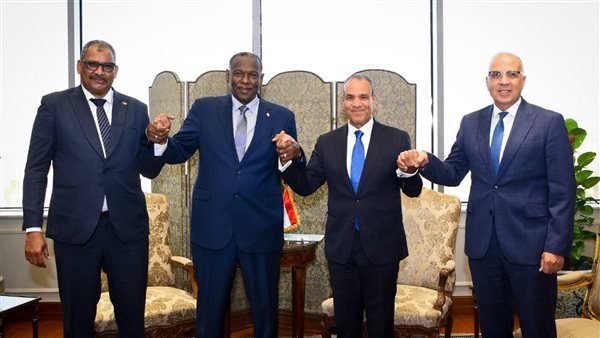Ahead of DERD Inauguration: How The Three Capitals Reacted?

Cairo – Sudanhorizon – Sabah Musa
With the official inauguration of the Grand Ethiopian Renaissance Dam (GERD) scheduled for the 9th of this month, Ethiopia is attempting to promote the idea of bilateral arrangements with Sudan excluding Egypt. This is being pushed through the leaking of information suggesting such agreements, alongside social media campaigns highlighting Sudanese artists’ participation in the opening ceremony.
Shared Interests
Egypt’s Minister of Irrigation, Hani Sewilam, and his Sudanese counterpart, Ismat Qureshi Abdullah, held a meeting in Cairo on Thursday, where they discussed and aligned their positions on several Nile water–related issues to safeguard the rights and interests of both countries. The two ministers stressed the need for full compliance with international water law regarding GERD.
Threat to Stability
This meeting followed a quadripartite gathering on Wednesday at Egypt’s Foreign Ministry headquarters, attended by the foreign and irrigation ministers of both nations. The discussions emphasized securing the water security of the Nile’s downstream states and joint work to fully preserve their water rights and uses, in accordance with the governing legal framework of the Nile and the 1959 Nile Waters Agreement.
The two sides agreed that the Ethiopian dam carries serious consequences for the downstream countries and represents a continuous threat to stability in the Eastern Nile Basin, particularly due to Ethiopia’s unilateral actions in filling and operating the dam, as well as the risks concerning dam safety, uncontrolled water discharges, and responses to drought. They urged Addis Ababa to adjust its policies in the Eastern Nile Basin to restore cooperation among the basin states.
Leaked Document
Coinciding with the Cairo meetings, Al Jazeera Net published a report Thursday revealing a leaked document allegedly signed on October 26, 2022, in Khartoum between Ethiopian representative Seleshi Bekele and Sudanese representative Sif El-Din Hamad Abdullah, as heads of their negotiating delegations. The document was reportedly endorsed by Ethiopia’s Minister of Water and Irrigation, Habtamu Itefa, and Sudanese Water Resources Minister, Eng. Daw Al-Bait Abdul Rahman Mansour.
Information Sharing
According to the report, the agreement included Ethiopia’s commitment to gradually fill the dam each rainy season (July–October) until reaching 625 meters above sea level, with storage reduced during droughts. Its preamble highlighted the interconnected safety and operations of GERD and Sudan’s Roseires Dam, requiring close coordination and joint action to address natural conditions and emergencies. It stressed that the goal of bilateral meetings was to exchange information and enhance mutual understanding on managing transboundary water resources, improving infrastructure management in the Nile Basin between Ethiopia and Sudan.
Stirring Confusion
This leak came just hours after the Cairo quadripartite meetings, seemingly as an attempt to disrupt coordination and agreements between the two downstream states. The timing gave the impression that Sudan had secret deals with Ethiopia. The report claimed the document was signed in 2022, nearly three years ago, by Sif El-Din Hamad—though he had ceased to head Sudan’s negotiating team since the previous regime.
The report also alleged that former Sudanese minister Daw Al-Bait endorsed the agreement. However, it remained unclear what “endorsement” meant in this context, given that ratification of treaties is the mandate of Sudan’s yet-to-be-formed legislative council. The constitutional document itself has since been amended. Attempts to reach Daw Al-Bait for comment were unsuccessful, but his past remarks to Sudanhorizon reflected confidence in Egypt’s alignment with U.S. mediation and underscored Sudan’s consistent coordination with Cairo in GERD negotiations.
No Harm, No Harassment
Even if Sudan had signed such a document, its provisions on information exchange and coordination were never implemented. The chaotic impact on Sudan’s dams—particularly Roseires, close to GERD—together with devastating floods during GERD’s recent discharges, demonstrate Ethiopia’s disregard for commitments. Addis Ababa has failed to uphold the principle of “no harm, no harassment,” despite downstream states’ acknowledgement that they do not oppose Ethiopia’s development projects so long as these do not harm Egypt or Sudan. Ethiopia has resisted binding agreements ensuring this.
Dam Inauguration
Ethiopian Prime Minister Abiy Ahmed invited Egypt and Sudan to attend the dam’s opening, claiming GERD poses no threat to them but instead offers an opportunity for regional cooperation and mutual benefit. Egypt’s Foreign Minister, Badr Abdelatty, dismissed the invitation as “nonsense,” stressing Cairo’s right to defend its water interests. He added that 13 years of negotiations had proven Ethiopia lacked the political will to conclude a binding legal agreement.
Sudan’s Priority
Former Sudanese Irrigation Ministry advisor, Dr. Ahmed El-Mufti, doubted Sudan ever signed the leaked document. “I have no knowledge of such a document, but I find it unlikely,” he told Sudanhorizon, stressing Sudan’s top priority is dam safety. He noted that information exchange serves dam safety rather than citizens’ lives, questioning: “What benefit is it to a citizen if Ethiopia informs Sudan tomorrow that GERD will collapse?” He emphasized that the real test lies in Ethiopia’s alignment with both Sudan and Egypt, not Sudan alone.
No Such Agreement
Sudanese security and strategic expert Dr. Amin Ismail Majzoub also dismissed the likelihood of such an agreement. “There may have been consultations, but I don’t believe there is any government document,” he said, adding that coordination between Egypt and Sudan over GERD has been strong since 2017. He argued that Ethiopia is simply seeking to create confusion ahead of its dam inauguration.
Strong Alignment
Egyptian water resources expert Dr. Abbas Sharaky underscored that Egypt and Sudan have always maintained strong coordination on GERD. “There is broad alignment in positions,” he told Sudanhorizon, noting both downstream states rejected the invitation to the opening ceremony and submitted joint letters to the UN Security Council against Ethiopia’s unilateral moves. “Ethiopia wants to drive a wedge between the downstream states,” he warned, adding that Ethiopia sometimes gave Sudan only one day’s notice before opening GERD’s gates, while Sudan’s Roseires Dam requires a week to prepare—hardly a true information exchange.
He stressed that Egypt and Sudan do not reject GERD per se, but reject its unilateral operation without a binding legal agreement.
Shortlink: https://sudanhorizon.com/?p=7430

